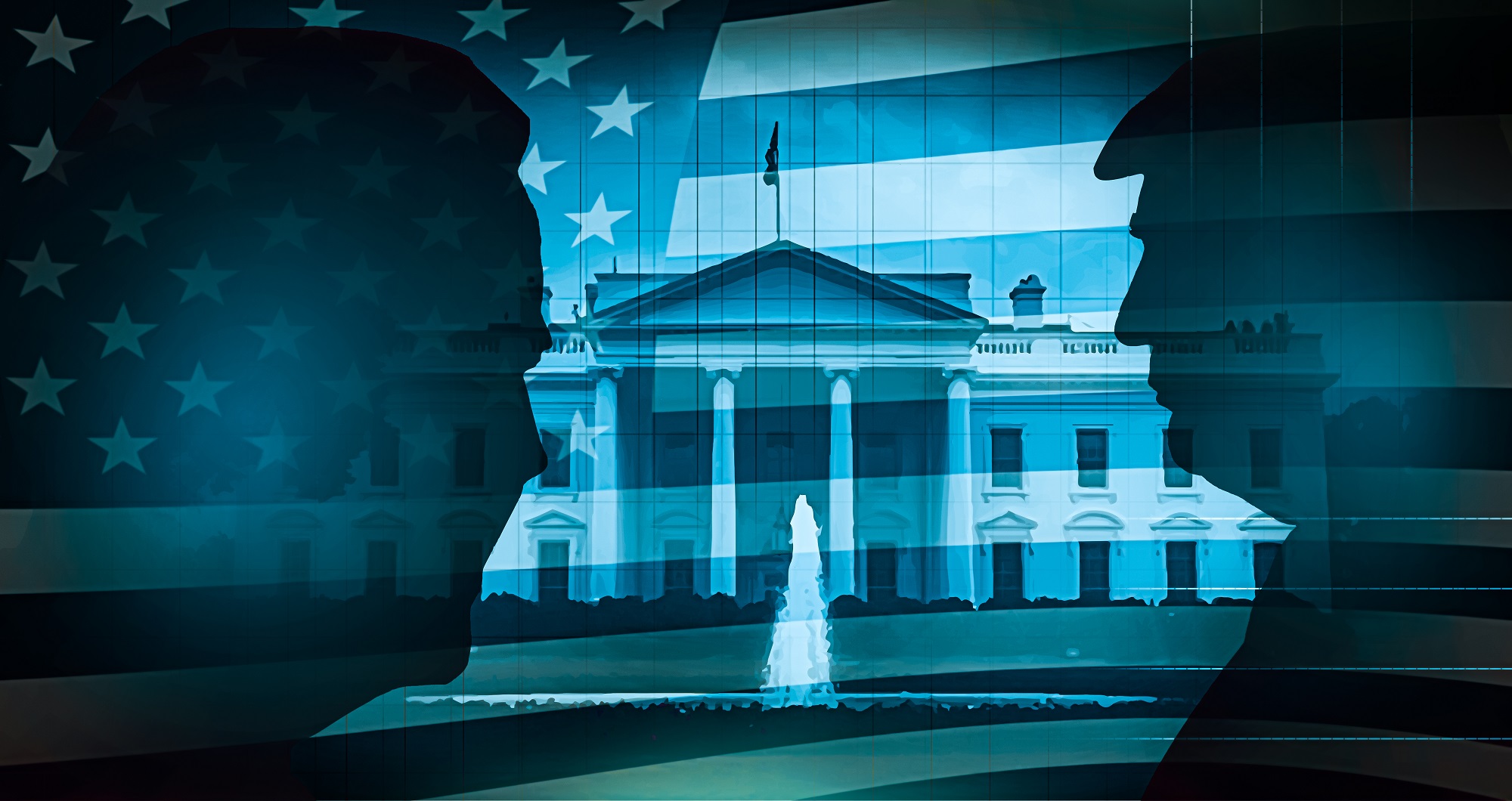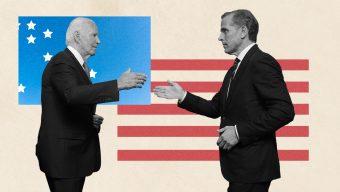Since the American Civil War, never have US elections been more divisive, US politics more confrontational. It is not surprising, therefore, that fear and uncertainty are the prevailing feelings at the closing of the electoral colleges. Fear – regardless of the final outcome – of possible riots because supporters on both sides have made clear that they have lost faith in the system and will not accept the results if their candidate does not win. Uncertainty, because US voting and counting procedures and machinery are way outmoded, a historical relic that could only work based on trust and loyalty. It will take days to call the elections. Trust in the US political system was lost many elections ago, flown away with those infamous butterfly ballots of Florida.
The media relays images of despair and street violence that could only be imaginable in a failed state. Sadly, that is precisely what these elections demonstrate, a state that has failed to deliver a legitimate outcome in time, a nation where basic consensus has been lost and the electorate has become intensely polarized, and a population so emotionally fraught that a competitor is considered an arch enemy. This is unfortunate news for the US and for all of us, because in these troubled times, the world needs a strong moral leader. The liberal democratic order cannot survive simply with strongmen or do-gooders. There is a lot of healing to do in America. It’s time for statesmanship. And this can only begin by addressing, rationally and dispassionately, the real issues: the American dream is failing, identity politics are tearing the country apart, and economic and social progress is no longer guaranteed. The land of the brave and the free must encompass all and to resume in the provision of essential public goods for its citizens.
European perception of US politics has always been biased and strongly ideological, but never to the point where it is now. Europe is a far superior social model, regardless of its inability to grow and create jobs. Consequently, finding a Trump supporter today in Europe is a near impossible task outside the closed ranks of the alt right movement. Traditional European political parties, right and left, have been essentially unanimously behind Biden. Yes, Trump’s personality and excesses, his insulting attitude, his disrespect for international norms and even for civilized standards, have alienated European public opinion. Trump has dared to question and confront the sacred covenant of the European Union, the institutional and ideological foundations of modern Europe. Yet, in a renewed Trump administration, Europe would have to find a way to learn to work with him and the USA, and admit that he may even have a point. European anti-Americanism is always an easy and popular temptation, but it would be a grave mistake.
Biden, on the contrary, is like an old friend – a traditional US democrat that in the European context would qualify as a liberal social democrat, an aged statesman than can be enjoyed like a good wine. But Europeans would be foolish to ignore that Trump did not change the US, and furthermore that a changed US is what made Trump possible. Even Biden will not be business as usual. America’s honeymoon with Europe is long over and despite sharing many values and principles, the two are now political and economic rivals. Trade disputes, near-shoring industrial policies, confronting China, data protection issues, and a revised Monroe doctrine will remain regardless of the US administration. The issues of climate change and multilateralism could turn out to be either the dividing lines or the very convenient anchor for renewed alliance. But in any case, Europe and the US must work together if the global challenges ahead of us are to be addressed.
The world needs, first and foremost, economic growth amidst this terrible COVID pandemic. It is far from certain that a Biden administration would deliver it. There is too much emphasis on the qualifiers (fair, sustainable, inclusive, gender-balanced, smart) and perhaps too little on the substance and growth that makes everything else possible. Alternatively, a second Trump administration obsessed with making America Great Again would have fallen into autarchy and threaten globalization and world trade, the main engine of global growth. Europe and the world need a thriving US economy, one that will continue assuming its international responsibilities as the consumer of last resort, and the provider of global liquidity. There is considerable risk of paralysis in American policy making, either because the President’s representation in the houses, which makes carrying out a mandate difficult, or because the President gets enmeshed in bitter domestic battles and loses sight of the bigger international picture.
Trump’s insistence on reducing bilateral US trade deficits has resulted in a policy of managed trade and the unilateral imposition of tariffs, also to a small list of European articles well selected to benefit local American producers. Europeans rejected unanimously this policy but ignored the similarities with some of their own trade ideas coming from the French president, Emmanuel Macron (buy European), the European Commission (make trade a geopolitical issue), or the negative world reaction to a unilateral carbon adjustment tax (CAT). A Biden administration will minimize trade issues, at least initially, and will improve American relations with the rest of the world, and certainly with Europe. But it will be no less adamant in requiring a firm position versus China and more action on reforming the WTO.
US policy towards China will not change substantially, beyond a more nuanced rhetoric and fewer aggressive tweets. Trump may have bullied his allies to fall in line on China and other security issues, but Biden will still demand, nicely, firmer support from US allies in four areas: restrictions to China’s state-owned enterprises, loosely defined to encompass the majority of China’s current multinationals; equal access to China’s internal market and potential retaliation measures; industrial property rights with the imposition of sanctions to companies engaged in dealings with corporate China; and the technological race where European data protection rules are perceived as unduly hurting American companies by impeding them from gaining the economies of scale necessary to compete with Chinese giants. The emerging European industrial policy of self-reliance and fostering European champions can only harbor additional confrontation with any US administration.
It is interesting to note an area of potential policy conflict with Europe that is of particular importance to Spain. This past September, Trump hastened the election of a US citizen as President of the Inter-American Development Bank (IDB), the main player in concessional funding to the region and a crucial instrument to address the very negative effects of the pandemic. The election of Mauricio Claver-Carone served to show off Trump’s strong arm tactics, by breaking the unwritten rule (instituted by US President Dwight Eisenhower by the way) that the position would always be held by a Latin American and also in an ironic revamp of the Monroe Doctrine, and ensured the IDB would work to offset China’s alliances and partnerships on the continent. Biden will tone down but essentially continue this policy, just under the current and better sold name of “near-shoring.” Moving production closer to the US to avoid supply chains disruptions evident with the COVID crises is good news for Latin America. Would Europe, and Spain specifically, learn how to cooperate and benefit from this or will the old anti-imperialism prism prevail and lead to a confrontation with the US administration, to the detriment of the region? Furthermore, what policy measures can Europe adopt to offset negative impacts on the less developed Asian economies?
President Biden will undoubtedly work to reestablish world trust in the US, and could easily enough start by mending the damaged relations with democratic allies, notably Europe. Two issues stand out as quick wins for both sides, working together to fight climate change and to restore the multilateral order. But let us not be naïve, serious policy differences exist on both counts. It is difficult to imagine a Biden administration moving decisively to a carbon-free economy in 2050 or to accept passively a European CAT. Also, although reforming the WTO would be the most effective signal to return to a multilateral rule-based regimen, it would require the Europeans to move much closer to the US’s traditional position of reigning in China’s gaming of the rules.
The war on COVID, and not on trade nor carbon, will define the new American administration. For this, closer international cooperation is clearly required. Curbing the pandemic and simultaneously maintaining a growth economy is crucial, all while enabling science and research to do the job of finding medical treatment and eventually a vaccine. Isolation is not an option for such a long and structural challenge to our way of life. Intensive cooperating across the Atlantic on health and economic policies may pave the way for restoring basic trust between the US and Europe. The pandemic is sure to leave lasting economic and social damages to the global economy. Biden is much better prepared to give Europe the opportunity it needs, (but even Trump could not have possibly believed that the US can win this war alone). What is necessary – for the US, for Europe, and frankly for the world – is a common approach to systemic economic issues like the restructuring of public debt of less developed and emerging economies thereby rebuilding social safety nets and preserving fiscal sustainability. The multilateral liberal order will be questioned, this is a given, and only concerted action by the US and Europe, together, will lessen the appeal of populist authoritarian solutions. Will the next US administration live up to international expectations?
This article was updated on November 11, 2020 to reflect news developments.
© IE Insights.











